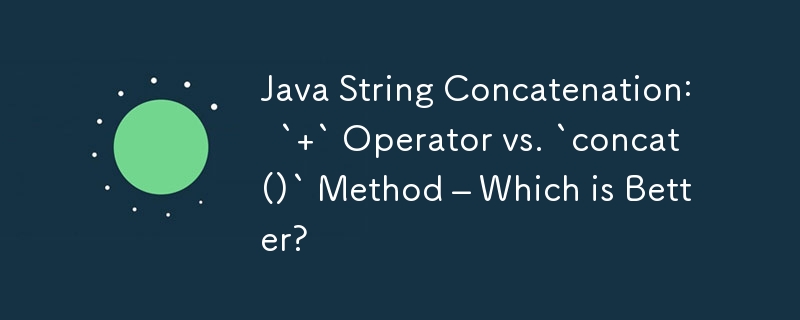

String Concatenation: A Comparison of concat() and the Operator
In Java, strings can be concatenated using either the operator or the concat() method. While both methods achieve the same result, there are subtle differences in semantics, behavior, and performance, leading to varying scenarios where one might be more appropriate than the other.
Semantics
The operator can accept both String and non-String values, converting the latter to strings using their toString() method. This makes it more versatile but less strict in terms of input validation. In contrast, the concat() method only accepts String values and throws a NullPointerException if either of the operands is null.
Behavior
Under the hood, concat() internally uses a StringBuilder to construct the new string, while the operator relies on a series of StringBuilder operations. Specifically:
This difference in behavior can lead to subtle differences in semantics. If a is null in a = b, the original value of a is treated as an empty string. However, in a.concat(b), a NullPointerException is thrown.
Performance
In general, concat() is more efficient for simple concatenations, especially with small strings. However, with larger string sizes or multiple concatenations, StringBuilder optimizations make the operator more performant.
Decompiling the Operator
Unfortunately, decompiling the operator using tools like javap -c is not straightforward as it does not provide a direct translation of the bytecode instructions. However, the source code of the String class (in the Sun JDK src.zip) reveals that the bytecode compiler employs an optimization technique to circumvent heavyweight string allocation. This optimization makes performance testing inconclusive unless precautions are taken to avoid JIT optimizations.
Summary
Understanding the nuances between concat() and the operator enables programmers to make informed decisions about which method to use based on the specific requirements of their code. For strict input validation, concat() is preferable. However, if versatility and optimal performance for larger string concatenations are desired, the operator with StringBuilder optimizations may provide better results.
The above is the detailed content of Java String Concatenation: ` ` Operator vs. `concat()` Method – Which is Better?. For more information, please follow other related articles on the PHP Chinese website!




